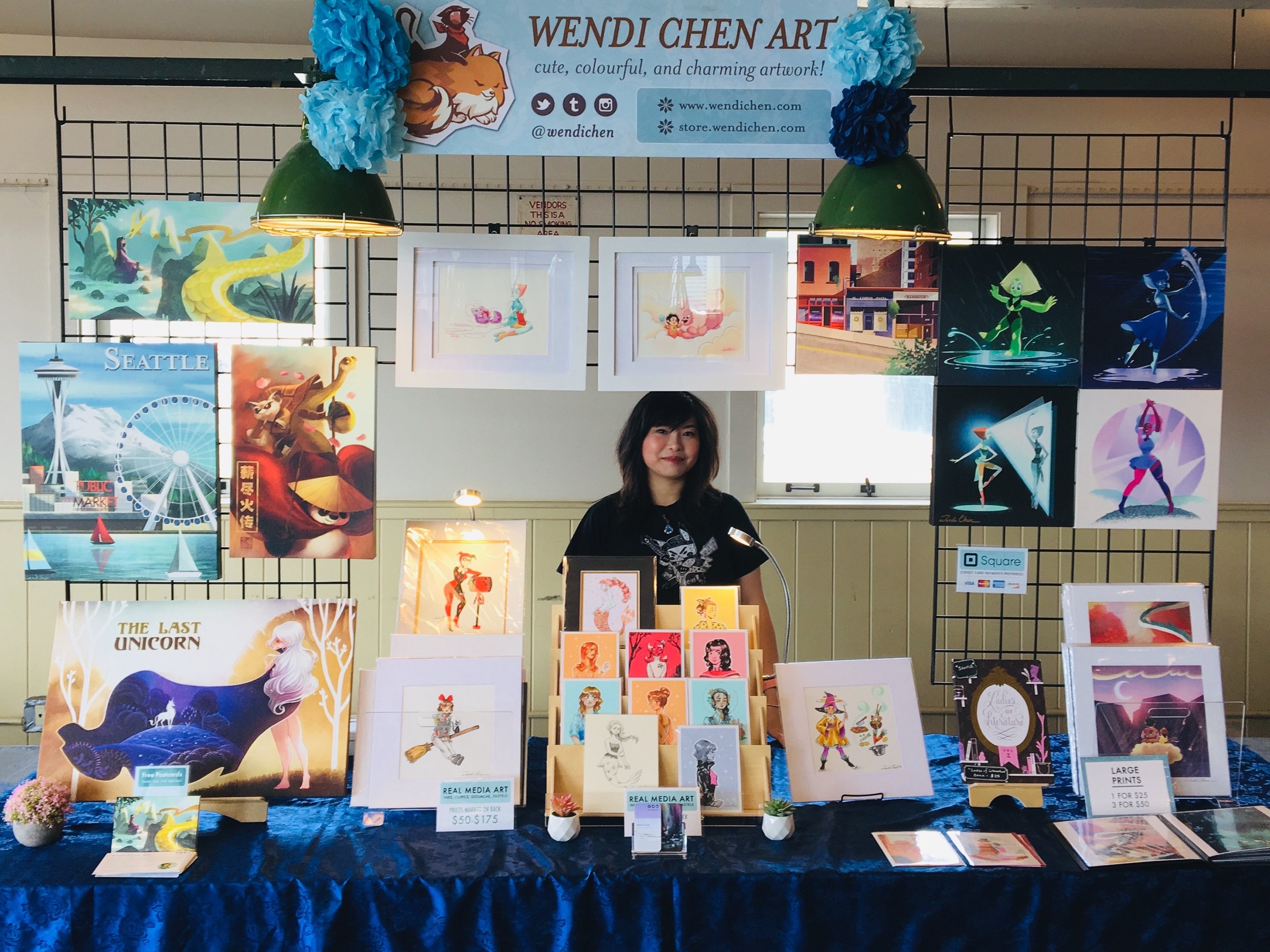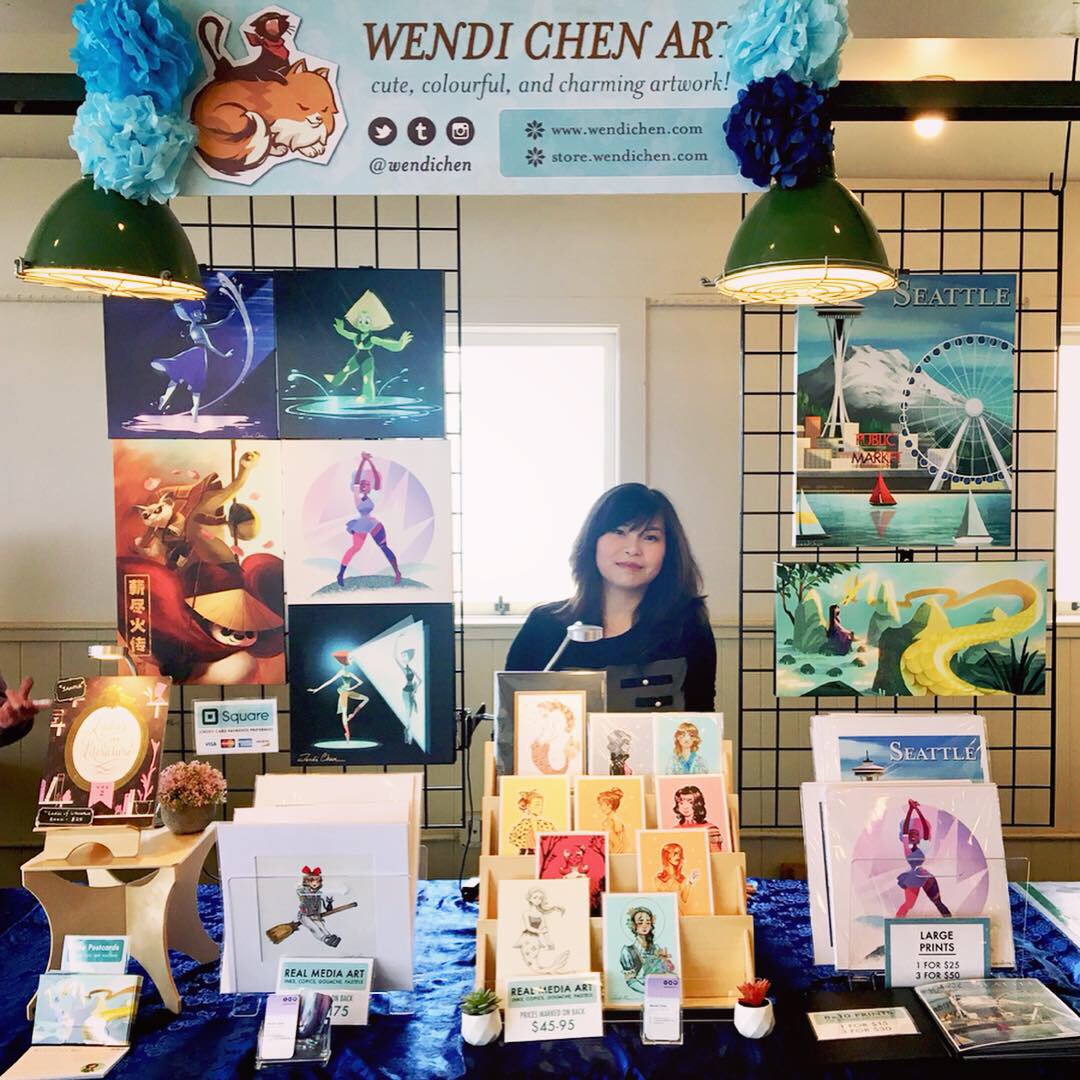Last updated on 12/30/2023.
The following Q&A was copied from an email response to Monze Nunez, a student from Portland who interviewed me for a school project. I also get a lot of these questions from parents and their kids, so I've tried to keep my answers as honest and helpful as possible!
1) How has your job changed since you started?
Art jobs have gotten more competitive over time, especially with globalization on the rise. Many of the more technical art jobs have been outsourced to places like China, India, and Korea… for instance, one of the game companies I worked for outsourced a bunch of their production art to a much cheaper Chinese studio. This made the in-house artists justifiably nervous, and I’ve since learned that we artists need to constantly update our skill sets to stay competitive.
Working in the video game industry for over a decade is what pushed me to become proficient with the entire Adobe Creative Suite, all while cultivating tertiary skills (UI Design, Product Design, Photography) in addition to my primary skill (Illustration). It’s not easy staying up to date with multiple skills/software, but being a jack-of-all-trades is a boon to any artist's career.
2) What advice do you have for someone considering this job?
It may sound harsh, but my advice to about 90% of wannabe artists would be, “Don’t do it unless you can’t imagine doing anything else.” Artists have to weather a lot of rejection and market ups and downs. If you’re easily discouraged and not especially self-motivated, then this isn’t the job for you.
If you know for certain that you want to pursue art as a career, then I suggest you start building up a portfolio while developing your technical skills through online courses like Schoolism and CG Master Academy. These courses offer guidance (and video critiques!) from working professionals for a fraction of the cost of a college course.
I haven’t heard from too many artists who recommend going to art school, given the exorbitant costs associated with getting an art degree these days. This strikes me as somewhat predatory on the part of colleges and private lenders, so please do your research to determine whether or not art school is the right choice for you.
3) How did you know this was what you wanted to do? Did you consider anything else?
Yes, I considered MANY career choices other than art. As a kid, I was always considered “gifted” in math and science, which I suppose is to be expected since both of my parents are engineers who encouraged and fostered my math skills. My parents strongly advised me to pursue a viable career as an Engineer or Pharmacist; in fact, I started out in the U of M Engineering College and finished up with a science degree to fulfill their Pre-Pharmacy requirements. While at college, I worked as a Pharm Tech at a retail pharmacy and also volunteered as a student researcher in an Orthopedic Surgery Laboratory. I quickly determined that I had neither the patience nor inclination for laboratory research, and working in a retail pharmacy made me bored out of my skull. So it was back to the drawing board, as they say.
I realized that I wanted to pursue art while I was at University because most of my free time was spent drawing, and it was by far my most enjoyable and long-lasting hobby. I’ve been drawing since I could hold a pencil, so I really can’t imagine a life without art. At first, I was scared because I didn't have an art degree or any formal art training at all. Fortunately, this was an easy hump to get over because most companies only look at your experience and portfolio!
4) How has technology changed your job?
I use technology every day for my job, so it’s fair to say technology has been crucial to my workflow. I’m primarily a digital artist, so most of my work is drawn on the computer using Adobe Photoshop and a Wacom Cintiq. Recently, I’ve been drawing a lot in Procreate with the iPad Pro and Apple Pencil. I love the immediacy and cleanliness of digital art. Even when I create traditional media paintings to sell at Pike Place Market, I’ll still digitally sketch everything beforehand to save time and paper.
I also utilize social media for self-promotion and connecting with fellow artists. Instagram and Twitter are particularly useful platforms for artists to share their work, and I’ve gotten several job offers and art tests through those sites.
5) How has the economy changed your job?
A bad economy can make people skittish and less willing to take risks, which is understandable since people have bills to pay and mouths to feed. The Seattle tech/gaming industry suffered a huge blow in 2017 when several game studios shut down and were forced to undergo massive layoffs—Runic Games and Motiga, to name a few. This made the job market even MORE competitive than it already was, and it just sucked for everyone involved in the industry because creatively-driven game studios with their own IPs are a rarity. Sometimes it feels like only gambling/casino games consistently make money, and, well… there’s not a whole lot of pride in making those. I know it sounds quixotic, but artists are idealists at heart and want to see their art used for something they can stand behind. (Other times, we’re just grateful to even have a job. It's a weird dichotomy.)
Witnessing all these layoffs that affected my friends in the video game and animation industries drove me to pursue more freelance work and self-dependent income sources. I began selling my artwork at Emerald City Comic Con in 2014 while I was working full-time at a game studio, partly because I wanted to pave the way for a side business. (And partly because my good friend Ken Taya roped me into it before I was entirely ready, haha!) Opportunities like that are around every corner, and seizing those opportunities as they come is a great way to ameliorate the effects of a bad economy.
6) How did you get your current job?
I currently work as a Craftsperson at Pike Place Market, where I manage my ever-changing booth as a small business owner. This job is extremely free-form in that you get to choose your schedule, but it also requires a degree of grit and entrepreneurship that I lacked in the beginning. It’s been a humbling learning process.
I got the job by applying to become a Craftsperson online, and shortly thereafter, I was scheduled for an in-person interview and screening. Fortunately, they had a 2D artist opening at the time and I was admitted the same year I applied!
7) What are your opinions on people who say what you do isn’t a real job?
I have to admit that I haven’t encountered anyone (who mattered) who claims that art is not a real job… many of my friends are professional artists in lucrative and well-respected fields, so that argument doesn’t hold water in the real world. If you’re making money doing art, then it’s a “real job” no matter how you look at it.
As for those “clients from hell” who strategically and purposefully undermine creative professionals—either by undervaluing their work or outright asking them to work for free—boy, do I have a bone to pick with them. It’s seldom worth your time to work “for the exposure,” since you could just use that time to create portfolio-worthy work that speaks to you personally. Furthermore, why would you want to work with someone who doesn’t value your time? Have some self-respect, do some research, and charge a fair wage tailored to each project. Your future self will thank you for it!
I hope these answers were helpful in some way, and I wish you the best of luck in all your professional pursuits. Take care and don’t stop creating!


